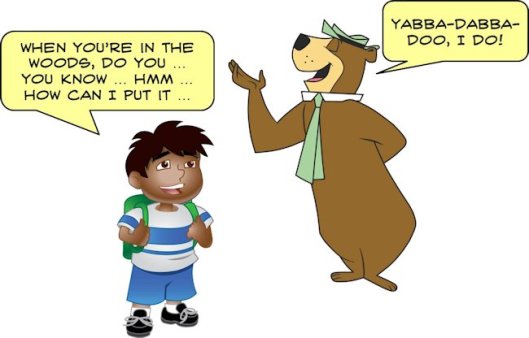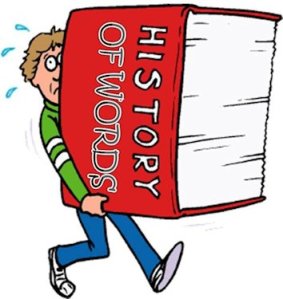Tags
Big toes, Do bears ...?, Etymology, Finding synonyms, God and Allah, How does soap work?, Is the Pope a Catholic?, Logophile, Maritime Warfare School, RhymeZone, Spelling tricks, The World Wide Web
I went for a walk this morning. The air was crisp; the sun was shining; the chilly westerly wind was in my face and blowing over the top of my hearing aids, creating a constant roaring sound in my ears; and all was good with the world. My route took me past open fields, a small fishing lake, and a huge solar-panel farm, the path winding its way around the back of a local Royal Navy establishment. I pondered on the words on the board at the main gate: Maritime Warfare School. Maritime—connected with the sea—is not a word we use very often and I wondered if there was a Maritime Peace School to offset the aggression implied in the title. Sadly, no, but that thought took me into thinking more about how the Web, the World Wide Web to give it its full grandiose title, has changed the way we learn about things.
Is there nothing I can’t find out, I asked myself? If I google, “Is the Pope a Catholic?” the answer soon comes back—apparently so.
 What about the proverbial bears and what they are supposed to do in the woods? Yes, definitely yes. Wear stout boots if you’re thinking of hiking in the woods.
What about the proverbial bears and what they are supposed to do in the woods? Yes, definitely yes. Wear stout boots if you’re thinking of hiking in the woods.
 Okay, let’s try how does soap work? Immediately, you’ll find the How Stuff Works website and there all will be revealed, the chemical mysteries of hydrophilicity and hydrophobicity.
Okay, let’s try how does soap work? Immediately, you’ll find the How Stuff Works website and there all will be revealed, the chemical mysteries of hydrophilicity and hydrophobicity.
Soap works because it is made up of molecules with two very different ends. One end of soap molecules love water – they are hydrophilic. The other end of soap molecules hates water but love oils – they are hydrophobic. Thus, the oily ends attract all the greasy scummy oils on your body and the aqua-attracted end attracts the water and rinses the oily stuff away. You didn’t know that, did you? Well, now you do, thanks to the Web. Go wash your hands. It’ll be a whole new experience.
 I use the Web a lot when writing. If I need a synonym for, say, exhilarating, I go to an online thesaurus and find any number of thrilling, invigorating, stimulating alternatives. If I need to discover the full meaning of an initialism, such as TASER (yes, it was originally an acronym), Acronym Finder reveals the surprising truth: Tom Swift And his Electric Rifle. It doesn’t quite fit, I know, but TSAER is difficult to say.
I use the Web a lot when writing. If I need a synonym for, say, exhilarating, I go to an online thesaurus and find any number of thrilling, invigorating, stimulating alternatives. If I need to discover the full meaning of an initialism, such as TASER (yes, it was originally an acronym), Acronym Finder reveals the surprising truth: Tom Swift And his Electric Rifle. It doesn’t quite fit, I know, but TSAER is difficult to say.
If you’ve ever wondered if there is a genuine English word containing a Q that is not followed by a U (something that has kept me awake at nights), a Google search reveals the answer—no. There are many Q-no-U words in use—burqa, Iraqi, niqab, qi (an acceptable Scrabble word), Qantas—but these are all loan words, words from another language. The only possible word of English origin I could find was qwerty, an easy word to type. So, now the next question arises—why is Q always followed by a U? This question drives you into the world of etymology, the origin of words, and leads inevitably to the Online Etymology Dictionary. What a fantastic website, a logophile’s paradise! There, all is explained. The U-after-Q habit dates back to Latin. So, now you know.
 Sometimes in my writings, I burst into poetry. I compose small but elegant poems. Here’s one:
Sometimes in my writings, I burst into poetry. I compose small but elegant poems. Here’s one:
The Picketty Witch has got a big snitch
And when she sneezes, it quivers.
When she feels the itch,
Senses the twitch,
She turns her head and delivers!
Now, how did I do this so quickly? Easy; I turned to the RhymeZone for inspirational rhyming words.
Spelling is another marvel. The problem with a dictionary, online or hard copy, is you need to know how to spell the word before you can look up how to spell it! If you can’t spell diarrhoea, no amount of guessing—diarrea, diorhia, diorrhea, the runs—will find it. Google has solved that problem. Just enter, “How do you spell diarrea?” into Google and up comes the correct spelling. Amazing!
 Even seemingly impossible things are easily discovered on the Web. A few weeks back, I walked across a field that had recently been used to grow a harvest of sugar beet. There were several beets still lying on the ground and I wondered if they were edible. Should I pop a couple in my rucksack, I wondered? When I got home, I googled the question. Back came the answer—no, leave them where they lie. They taste awful.
Even seemingly impossible things are easily discovered on the Web. A few weeks back, I walked across a field that had recently been used to grow a harvest of sugar beet. There were several beets still lying on the ground and I wondered if they were edible. Should I pop a couple in my rucksack, I wondered? When I got home, I googled the question. Back came the answer—no, leave them where they lie. They taste awful.
That got me thinking about more philosophical things. Is God the same as Allah and, if so, why do some Muslims hate Christians? That one took me off into the realms of religion, metaphysics, and madness. I abandoned that question and searched instead to find out why, on average, one big toe is always bigger than the other. Apparently, it’s either genetic, environmental, or down to chance.
 There are many other things you can find on the Web—film reviews, book reviews, best buys, the latest news—many many things and it does raise one final question. Is there anything I can’t find on the Web? Hmm. I’d better google that question and see what comes up.
There are many other things you can find on the Web—film reviews, book reviews, best buys, the latest news—many many things and it does raise one final question. Is there anything I can’t find on the Web? Hmm. I’d better google that question and see what comes up.
Enjoy your browsing.
(^_^)

Ask the web `How do you milk chocolate?’ Just a joke Ben
LikeLike
I couldn’t find an answer to your question but I did find out you can’t make milk chocolate by feeding a cow chocolate, nor does chocolate come from brown cows. I never knew that!
LikeLike